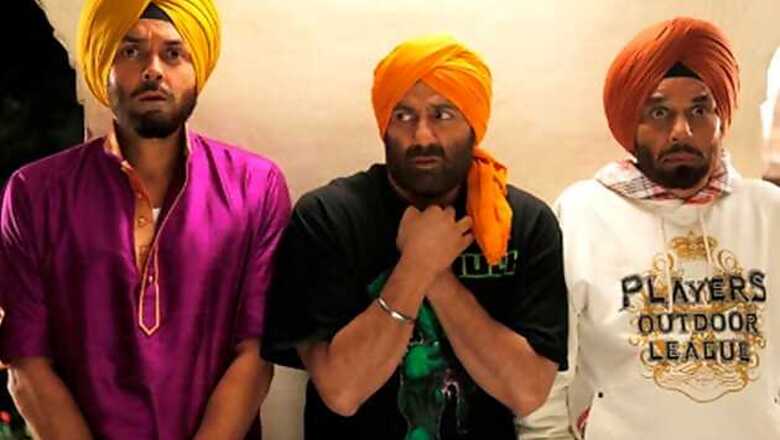
views
New Delhi: In almost every interview to promote 'Yamla Pagla Deewana 2', Sunny Deol brings up the point of spending huge amount of money on promotional events. The producers keep the promotional budget ready from the last day of shooting and they have their reasons for doing so, but there are ample examples of films failing badly at the box-office despite being pushed hard.
We live in the age of media invasion where it is really hard to recall the exact focus point of an advertisement. Sometimes we remember a slogan and most of the times faces, which eventually makes it a business of brand value of a particular actor or filmmaker. Indian film markets are still not very receptive of the auteurs and this brings back the focus on stars. The attention span of a potential consumer is very less and thus like any other product the name of the film needs to be thrust on his face, constantly. Lately, a new dimension has been added to this process. Now, the promotions keep happening for at least seven days after the release of the film in order to make the audience believe that the film is doing well at the box-office.
Reviews start coming from Friday morning and even if they are average and the film has big stars, it has a chance to catch up the momentum by Sunday evening. Cinema is still not considered as the documentation of time in India and this prompts the viewers to take it as an entertainment tool, which means the spectators will be more dependent on the 'word of mouth' publicity. If it is positive then they are likely to follow their earlier plan of watching the film anyway.
'Himmatwala' is a contradictory example to whatever has been said so far. What was the exact problem as we have seen worse films fairing better at the ticket window? It seems the tone of the publicity campaign didn't go down well with reviewers and relatively 'informed' audience groups.
The case of 'Ishkq In Paris' is also interesting because the content of the film decided its fate. Another problem was that the music was launched much before the film and in absence of sustainable songs the album failed to create any foreground for the film. Acting becomes secondary for the consumers when the actor or actress associated with the film has a clear cut image. The success of Aamir, Hrithik and Ranbir demonstrate that the audience is constantly looking for a change.
But, then Salman Khan, Ajay Devgn and Akshay Kumar are successfully repeating themselves. Their success can be attributed to the planned media campaign. Apart from TV and internet promos, these actors (Who are also the producers) remind the viewers about the film at six separate stages at least - first look launch, teaser-trailer launch, music launch, TV interviews, city tours and quirky videos.
It's not like that the spectators don't have any other entertainment options but huge media drives punch in their minds that they need to watch a particular film to keep pace with the happenings.
Earlier, hand painted posters and billboards worked in favour of the film because they were placed at crowded markets, now the internet has replaced them. Twitter, Facebook, Pinterest and several other social networking sites give the potential audience a feel of being exclusive, which eventually begins his association with the film.
A look at the recently successful films such as 'Shootout At Wadala', 'Aashiqui 2' and 'Race 2' would reveal that post-release advertising is equally important than the pre-release marketing. If the makers keep projecting that their films have garnered enough money, the undecided spectators tilt in their favour.
The 'not-so-good' state of the alternative entertainment in metropolitans helps the movie business as films remains the only medium worth spending on.
It's true that sometimes the filmmakers opt for low key opening for their films but this happens only when the film is made on a small budget and is expected to be liked by the critics. DVD sales can also contribute to the collection, so it works for a small budget film. However, an increase in budget lead to a panic attack for the producers which make them take precautionary measures.
Films are also a device of creating a nationalised symbol, a common identity, and that's why a number of products feel proud in associating with a movie. These associated market forces are immensely helpful in recovering the cost of the film, so one can't really refuse them which in turn makes the poster of the film visible on cups, mugs and cola bottles.
The success of films like 'Pyaar Ka Punchnama', 'Vicky Donor' and 'Kai Po Che' suggests that content rules the game but how will these films get visibility along with the likes of 'Dabangg', 'Gangs of Wasseypur' and 'Rowdy Rathore' in absence of a big media drive?
The film has to be good but it should be promoted well to capture the attention of exhibitors. It's a simple fundamental rule, more screens are directly proportional to more revenue. Had it been not the case, films like 'Jalpari' and 'Manorama Six Feet Under' wouldn't have been dependent on DVD sales.
We have seen the daring promotional activities backfiring sometimes, still they recover a good part of the production budget before anybody realises about the quality of the content.
In addition to it, foreign markets have emerged as a good source of income and they are required to be wooed via jazzed up events and high profile celebrity drives.
The trend doesn't look to fade away in next 2-3 years. You just need to glide your glance over the list of most successful films in recent years, most of these films are full of stars and were promoted frantically. You make money through money after all.
One good thing is that the small and less promoted films are also making inroads to the audience's heart and the number of such films is increasing with each year but massive efforts are needed on their part to form a conscience about only 'content driven' films.####



















Comments
0 comment